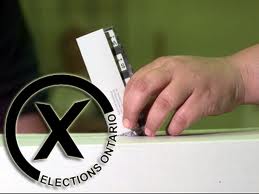The Ontario election on June 12 is one of the most unpleasant — and unpredictable — contests in recent memory.
There is no excitement in this campaign, no sense that a brighter future lies ahead. The emotions generated by the three principal parties are negative. There is disgust with the Liberals — disgust both with the scandals of the previous Dalton McGuinty regime and with the lack of contrition displayed by the Liberals currently clinging to power under Kathleen Wynne. Why can’t they say they are sorry, tell us how much their malfeasance has actually cost Ontario, and ask forgiveness for treating public funds with such contempt?
Disgust with the Liberals is matched by fear of Tim Hudak and his merry band of Tory slashers who would return Ontario to the days of Mike Harris — the era of cutbacks that produced the Walkerton tainted water tragedy, along with decaying infrastructure, hospital closures, shortages of nurses and doctors and the layoff of teachers at a time when what the province’s schools needed most was more teachers.
No one — not even hard-core Progressive Conservatives — believes Hudak can create the one million new jobs he promises. But everyone fears he will do his darnedest to eliminate 100,000 public servants, regardless of who gets hurt in the process.
To disgust with the Liberals and fear of Hudak, add nervousness and incomprehension about Andrea Horwath and her New Democrats. We used to think we knew what that party, as social democrats, stood for. Not any longer.
In a seeming fit of political insanity, Horwath rejected a Liberal budget that was skewed so far to the left that it could have been dictated by NDP Central. What was Horwath thinking? Did she want to make Tim Hudak premier? Surely, she didn’t think she could win Queen’s Park herself.
We know Hudak has staked out the hard right. Having experienced Mike Harris, we can anticipate what to expect if Hudak wins — a Conservative administration wedded to austerity and minimal government. We have seen Wynne seize the progressive left, offering activist Liberal government more than willing to intervene in the economy. And Horwath and the NDP? They are now somewhere in the murky middle.
If the public is conflicted, the pollsters are bewildered. They are chasing their tails all over the electoral map.
Three major polls were published last week. At midweek, Forum Research reported that the Liberals had jumped ahead of the Tories (38 per cent to 35), apparently a reaction to Hudak’s promise (or threat) the week before to rid the province of those 100,000 civil servants. But a second polling company, Ipsos Reid, must have been talking to different Ontarians, because the next day it reported that the PCs were on the cusp of a majority, with 40 per cent to the Liberals’ 33 per cent.
On Saturday, however, a third pollster, Ekos Research, reported that the Liberals had opened a seven-point lead over the Conservatives — 37 per cent to 30. Ekos found that the Liberals had significant leads among baby boomers and among women voters while the Tories continued to hold an edge among pre-boomers (age 65-plus) and among male voters.
The various pollsters agreed on one thing: the NDP is out of the race. “Horwath’s party has cratered,”says Frank Graves, president of Ekos.
So if the race is down to two parties, how tight is it? Eric Grenier, the analyst who runs a poll aggregator called ThreeHundredEight.com, says when the three new polls and others are merged, they show a dead heat in popular vote with the Tories and Liberals both at 36 per cent, followed by the NDP at 22 per cent. Grenier’s seat projection, based on the regional distribution of this support, gives the Liberals 49 of the Legislature’s 107 seats, to 44 for the Conservatives and 14 for the NDP.
With the electorate so uncertain, the leaders’ debate on June 3 — nine days before the vote — assumes unprecedented importance.
Cambridge resident Geoffrey Stevens, an author and former Ottawa columnist and managing editor of the Globe and Mail, teaches political science at Wilfrid Laurier University and the University of Guelph. His column appears weekly in Waterloo Region Record and Guelph Mercury. He welcomes comments at [email protected]



